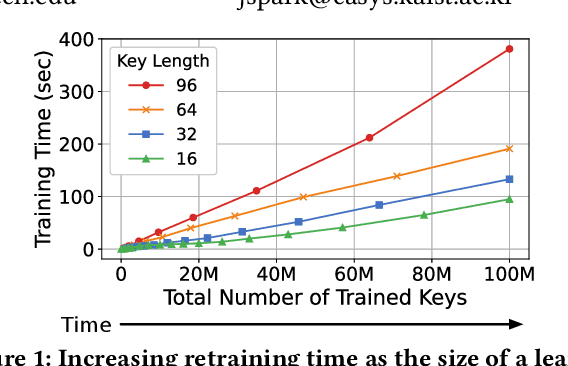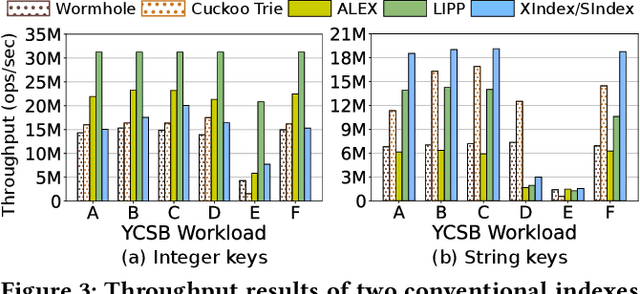Guseul Heo
Déjà Vu: Efficient Video-Language Query Engine with Learning-based Inter-Frame Computation Reuse
Jun 17, 2025Abstract:Recently, Video-Language Models (VideoLMs) have demonstrated remarkable capabilities, offering significant potential for flexible and powerful video query systems. These models typically rely on Vision Transformers (ViTs), which process video frames individually to extract visual embeddings. However, generating embeddings for large-scale videos requires ViT inferencing across numerous frames, posing a major hurdle to real-world deployment and necessitating solutions for integration into scalable video data management systems. This paper introduces D\'ej\`a Vu, a video-language query engine that accelerates ViT-based VideoLMs by reusing computations across consecutive frames. At its core is ReuseViT, a modified ViT model specifically designed for VideoLM tasks, which learns to detect inter-frame reuse opportunities, striking an effective balance between accuracy and reuse. Although ReuseViT significantly reduces computation, these savings do not directly translate into performance gains on GPUs. To overcome this, D\'ej\`a Vu integrates memory-compute joint compaction techniques that convert the FLOP savings into tangible performance gains. Evaluations on three VideoLM tasks show that D\'ej\`a Vu accelerates embedding generation by up to a 2.64x within a 2% error bound, dramatically enhancing the practicality of VideoLMs for large-scale video analytics.
LLMServingSim: A HW/SW Co-Simulation Infrastructure for LLM Inference Serving at Scale
Aug 10, 2024Abstract:Recently, there has been an extensive research effort in building efficient large language model (LLM) inference serving systems. These efforts not only include innovations in the algorithm and software domains but also constitute developments of various hardware acceleration techniques. Nevertheless, there is a lack of simulation infrastructure capable of accurately modeling versatile hardware-software behaviors in LLM serving systems without extensively extending the simulation time. This paper aims to develop an effective simulation tool, called LLMServingSim, to support future research in LLM serving systems. In designing LLMServingSim, we focus on two limitations of existing simulators: (1) they lack consideration of the dynamic workload variations of LLM inference serving due to its autoregressive nature, and (2) they incur repetitive simulations without leveraging algorithmic redundancies in LLMs. To address these limitations, LLMServingSim simulates the LLM serving in the granularity of iterations, leveraging the computation redundancies across decoder blocks and reusing the simulation results from previous iterations. Additionally, LLMServingSim provides a flexible framework that allows users to plug in any accelerator compiler-and-simulation stacks for exploring various system designs with heterogeneous processors. Our experiments demonstrate that LLMServingSim produces simulation results closely following the performance behaviors of real GPU-based LLM serving system with less than 14.7% error rate, while offering 91.5x faster simulation speed compared to existing accelerator simulators.
Accelerating String-Key Learned Index Structures via Memoization-based Incremental Training
Mar 18, 2024



Abstract:Learned indexes use machine learning models to learn the mappings between keys and their corresponding positions in key-value indexes. These indexes use the mapping information as training data. Learned indexes require frequent retrainings of their models to incorporate the changes introduced by update queries. To efficiently retrain the models, existing learned index systems often harness a linear algebraic QR factorization technique that performs matrix decomposition. This factorization approach processes all key-position pairs during each retraining, resulting in compute operations that grow linearly with the total number of keys and their lengths. Consequently, the retrainings create a severe performance bottleneck, especially for variable-length string keys, while the retrainings are crucial for maintaining high prediction accuracy and in turn, ensuring low query service latency. To address this performance problem, we develop an algorithm-hardware co-designed string-key learned index system, dubbed SIA. In designing SIA, we leverage a unique algorithmic property of the matrix decomposition-based training method. Exploiting the property, we develop a memoization-based incremental training scheme, which only requires computation over updated keys, while decomposition results of non-updated keys from previous computations can be reused. We further enhance SIA to offload a portion of this training process to an FPGA accelerator to not only relieve CPU resources for serving index queries (i.e., inference), but also accelerate the training itself. Our evaluation shows that compared to ALEX, LIPP, and SIndex, a state-of-the-art learned index systems, SIA-accelerated learned indexes offer 2.6x and 3.4x higher throughput on the two real-world benchmark suites, YCSB and Twitter cache trace, respectively.
 Add to Chrome
Add to Chrome Add to Firefox
Add to Firefox Add to Edge
Add to Edge